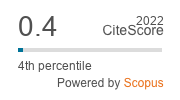Two-sex life table and host preference studies of Bactrocera dorsalis Hendel (Diptera: Tephritidae)
DOI:
https://doi.org/10.33307/entomon.v46i1.582Abstract
Oriental fruit fly, Bactrocera dorsalis, is a serious invasive pest in tropical and subtropical countries. The stage-specific two-sex pooled life table of B. dorsalis on four different fruits (guava, water apple, rose apple and mango) were studied during 2018-2020. The life table showed that the survivorship of B. dorsalis falls in Type III with about 41.394-33.827per cent of the eggs successfully reached adult stage. The highest mortality recorded was in the egg and adult emergence stages with kx of 0.045-0.113 and 0.032-0.192, respectively. The average potential fecundity (Pf) was 223-362 eggs female-1. The intrinsic rate of natural increase (rm) was 0.021-0.035 female-1 day-1 with mean generation time (Tc) of 194.058-148.710 days. The net reproductive rate (Ro) was 61.504-176.006 female offspring per female and the population doubling time (DT) was within 32.719-19.946 days. The population dynamics of B. dorsalis were significantly influenced by the host fruits due to their respective phytoconstituents in terms of host suitability or susceptibility (guava> water apple> rose apple> mango). Host preference of B. dorsalis was in the order of guava> water apple>rose apple.


